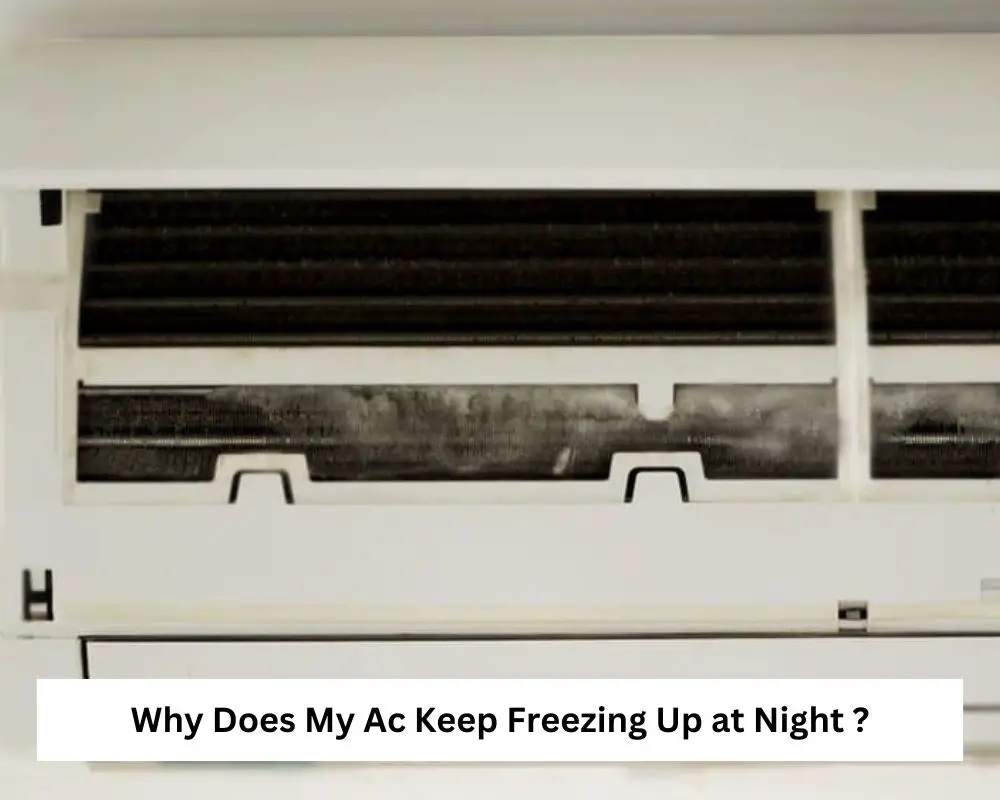The latest information about Why Does My Ac Keep Freezing Up At Night that you need can be found in this article, all of which we have summarized well.

Why Does My AC Keep Freezing Up at Night?
On a sweltering summer night, when the only respite you seek is from the cool embrace of your AC unit, a sudden freeze-up can be a disheartening experience. The comforting hum that once lulled you to sleep is now replaced by an eerie silence, and your room transforms into a sauna, making it almost unbearable to catch a wink of sleep.
This blog post will delve into the reasons why your AC may be freezing up at night, providing you with a comprehensive understanding of the issue and potential solutions to restore your cool sanctuary.
AC Basics: Understanding the Cooling Process
Before we dive into the causes of AC freeze-ups, let’s first understand how an AC unit operates. The fundamental principle behind AC cooling lies in the refrigeration cycle, a continuous process involving four key components: the compressor, condenser, expansion valve, and evaporator.
In essence, the compressor compresses refrigerant gas, increasing its pressure and temperature. The high-pressure gas then travels to the condenser, where it releases heat to the outside environment, causing it to condense into a liquid. The liquid refrigerant then passes through the expansion valve, which reduces its pressure and temperature. Finally, the low-pressure refrigerant enters the evaporator, where it absorbs heat from the indoor air, causing it to evaporate back into a gas. This cycle repeats continuously, removing heat from the indoor space and releasing it outdoors.
Causes of AC Freeze-Ups at Night
Several factors can contribute to an AC unit freezing up at night. Identifying the underlying cause is essential for finding an effective solution.
- Restricted Airflow: Insufficient airflow over the evaporator coil can cause the coil to become too cold, leading to ice formation. This can be caused by dirty air filters, blocked air vents, or a reduced fan speed.
- Low Refrigerant Levels: An inadequate amount of refrigerant in the system can result in reduced heat transfer, causing the evaporator coil to freeze. This can be caused by leaks or improper charging.
- Dirty Evaporator Coil: A dirty evaporator coil can impede heat transfer, causing the coil to become too cold and freeze up. This can be caused by dust, dirt, or pet hair accumulating on the coil.
- Oversized AC Unit: An AC unit that is too large for the space it is cooling can lead to short cycles, preventing the evaporator coil from fully defrosting. This can result in ice buildup over time.
- Faulty Thermostat: A malfunctioning thermostat can send incorrect signals to the AC unit, causing it to run continuously or at inappropriate times, leading to freeze-ups.
Tips and Expert Advice for Preventing AC Freeze-Ups
To prevent AC freeze-ups at night and ensure a comfortable sleep, consider the following tips:
- Regular Maintenance: Schedule regular AC maintenance with a qualified technician to ensure proper operation and prevent potential issues.
- Clean Air Filters: Replace or clean air filters every month, especially during peak cooling season, to maintain optimal airflow.
- Clear Air Vents: Keep air vents unobstructed to allow for proper air circulation throughout the space.
- Set Thermostat Appropriately: Adjust the thermostat to a comfortable temperature and avoid extreme settings. Gradual temperature changes are less likely to cause freeze-ups.
- Avoid Running AC Continuously: Give your AC unit time to rest and defrost by setting it to run on a cycle or using a programmable thermostat.
- Check for Leaks: If you suspect a refrigerant leak, contact a qualified technician immediately to prevent further damage and ensure safety.
Frequently Asked Questions (FAQs) about AC Freeze-Ups
To address some common questions related to AC freeze-ups, here are a few FAQs:
- Q: Why does my AC freeze up only at night?
A: AC freeze-ups at night may be more noticeable due to lower ambient temperatures and reduced airflow while you sleep. However, freeze-ups can occur at any time if the underlying cause is not addressed.
<li><strong>Q: Can I fix an AC freeze-up myself?</strong> <br> A: While some simple solutions, such as cleaning the air filter, can be attempted by homeowners, it is generally recommended to contact a qualified AC technician for proper diagnosis and repair to ensure safety and prevent further damage.</li>
<li><strong>Q: How long does it take for an AC unit to defrost?</strong> <br> A: The defrost cycle can vary depending on the AC unit and the severity of the freeze-up. Typically, it can take anywhere from a few minutes to several hours for the ice to melt and the AC unit to resume normal operation.</li>Conclusion
Understanding the causes of AC freeze-ups and implementing preventive measures can help you maintain a comfortable indoor environment throughout the summer months. By addressing airflow restrictions, ensuring adequate refrigerant levels, cleaning the evaporator coil, sizing your AC unit appropriately, and using a properly functioning thermostat, you can effectively prevent nighttime freeze-ups and enjoy a restful sleep.
If you are experiencing frequent AC freeze-ups or suspect a more complex issue, do not hesitate to consult a qualified AC technician. They can provide professional diagnosis, repair, and maintenance to restore your AC unit to optimal performance and ensure your comfort during the hot summer months.
Are you experiencing AC freeze-ups at night? Share your experiences and ask any questions you may have in the comments below. Together, let’s create a cool and comfortable indoor environment for your summer nights.

Image: www.lawescompany.com
We express our gratitude for your visit to our site and for reading Why Does My Ac Keep Freezing Up At Night. We hope this article is beneficial for you.